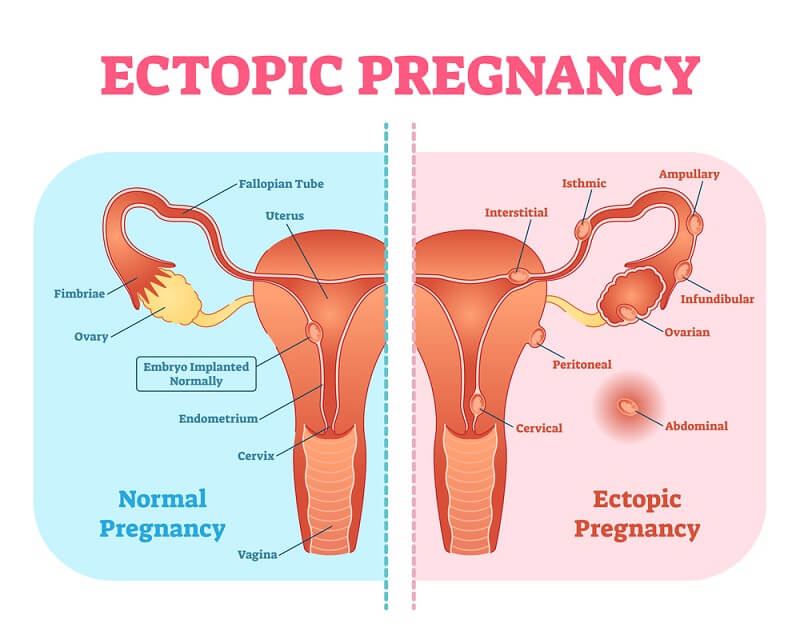What is an ectopic pregnancy?
Ectopic pregnancies are a scary type of pregnancy we may hear about from time to time. There is a large risk to the pregnant person with this type of pregnancy. Why is this type of pregnancy so risky, and why does it happen?
How do ectopic pregnancies occur?
This type of pregnancy happens when a fertilized egg implants outside of the uterine cavity. This happens to about 1 to 2 percent of pregnant people. If the ectopic pregnancy ruptures this can in the worst situations cause death. Ectopic pregnancies account for 2.7% of deaths related to pregnancy. This type of pregnancy is very dangerous and requires medical attention immediately. Some people are more likely to experience an ectopic pregnancy than others. There are a few risk factors that may cause ectopic pregnancies, including pelvic inflammatory disease, smoking, fallopian tube surgery, a previous ectopic pregnancy, and infertility. Doctors will typically look for an ectopic pregnancy in any patient that has vaginal bleeding or lower abdominal pain. [1]
Ectopic pregnancies can be difficult to diagnose. A timely diagnosis is extremely important in the case of ectopic pregnancies. Ultrasounds are used to diagnose ectopic pregnancies. Sometimes ectopic pregnancies go unnoticed initially on ultrasounds; about 40% of cases will be undiagnosed after an initial exam. Any patient that is expected to have an ectopic pregnancy should be given a thorough exam to ensure that a diagnosis is made. [2]

How are ectopic pregnancies treated?
Ectopic pregnancies can be treated in a few different ways. The developing embryo cannot be saved in this pregnancy. Usually, the fetus needs to be removed before there are serious complications for the pregnant person.
Expectant management is an option used when the symptoms are mild. In this scenario, the pregnancy will typically dissolve on its own. This treatment plan requires frequent blood tests and health screening to ensure the patient is not at any risk.
Medicine may be prescribed to stop the pregnancy from growing. Usually, the medicine called methotrexate is given as an injection to stop the pregnancy from progressing. This medicine can be harmful to any future pregnancy for three months, so using contraceptives after this treatment is recommended.
Surgery is another treatment option. The procedure usually used is called laparoscopy. Usually, the affected fallopian tube is removed if the other one is healthy to allow for future pregnancies. After surgery, it typically takes four to six weeks to recover. [3]
If you encounter an ectopic pregnancy, your doctor will guide you to the treatment plan that is best for you. This type of pregnancy is very scary and can be harmful to your health. If you have any of the risk factors, you should speak with your doctor and understand the symptoms and warning signs of an ectopic pregnancy. With careful treatment and monitoring, those who do have ectopic pregnancies should recover well and be able to conceive in the future if they wish.
Sources:
[1] Hendriks E, Rosenberg R, Prine L. Ectopic Pregnancy: Diagnosis and Management. Am Fam Physician. 2020 May 15;101(10):599-606. PMID: 32412215.
[2] Baker M, dela Cruz J. Ectopic Pregnancy, Ultrasound. 2022 May 1. In: StatPearls [Internet]. Treasure Island (FL): StatPearls Publishing; 2022 Jan–. PMID: 29489174.
[3] https://www.nhs.uk/conditions/ectopic-pregnancy/treatment/





